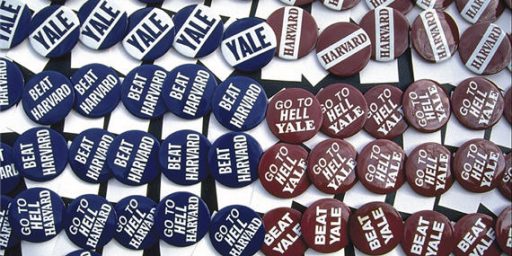Academic Moneyball
George Mason lawprof Ilya Somin argues that academic departments can take advantage of the Moneyball approach to quickly build a top-notch faculty comprised of undervalued young scholars. Tufts political scientist Dan Drezner is unconvinced, believing that the Big Boys can simply poach free agents once the best of the best have revealed themselves.
It’s unclear to me what the academic equivalent of on base percentage, sluggling percentage, and earned run average — let alone the more complicate SABRmetric statistics — would be. Certainly, schools can try to identify subspecialties or philosophical orientations that are up-and-coming and try to get ahead of the curve. There’s no reason to think, though, that a hiring committee at a mediocre school would be consistently better at that than those at the elite schools.
Presumably, an academic Moneyball would rely on identifying productive researchers or grant seekers. Those qualities are at least somewhat quantifiable. Finding excellent teachers would be harder to do using a statistical approach although it would more truly embody the Moneyball approach of seeking out players who perform well in important but undervalued tasks.
UPDATE (Chris Lawrence): I posted some thoughts over at my personal blog on this debate as well.






Just as a thought experiment, imagine if a school only interviewed white male applicants (ignore the legal implications for a moment). They have a finite number of applicants they can interview, so this is a scarce resource to be spent wisely. The competition for non-white male academics is high in the current society. For many positions, white males need not apply as they wouldn’t help on the all important diversity goals.
Now if you say that a white male is just as likely to be the next star as a non-white male, then you aren’t spending time on prospects that may go elsewhere (due to the diversity hiring goals) and more on the pool you are likely to win. Further, the chance of finding the top notch candidate is improved because you are looking in a field as rich as any other, but with less competition to have already snatched up the good parts.
As an example, if you knew there were two places to sink your mine, both of which would be expected to yield one pound of ore for every ton of rock, would you rather sink a shaft in the mountain with many other mines going in or the one with no mines be sunk?